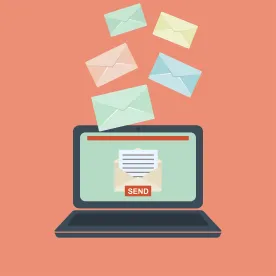Email management for lawyers and professionals across most industries is a constant uphill battle. In fact, the average professional spends 28 percent of the workday reading and answering emails, according to McKinsey. A lawyer has to pay special attention to their inbox because they often receive lucrative client and business information. However, they’re also overloaded with industry updates, bar association newsletters, and civic engagement emails.
For a professional who bills by the hour, sifting through hundreds of emails is not only time-consuming but unprofitable. Email can also be a distraction and inhibit effective time management.
Here are some practical tips for email management for lawyers.
-
Take Advantage of Email Management Features and Shortcuts
-
Use Filters to Keep Inboxes Organized
-
Schedule Email Correspondence
-
Priotize Emails
-
Switch Internal Communication to Other Platforms
-
Clear the Clutter
-
Unsubscribe to Miscellaneous Emails
-
Disable Social Media Notifications
-
Embrace Legal Technology Solutions
1. Take Advantage of Email Management Features and Shortcuts
Email platforms have tons of features and shortcuts to make work more efficient and improve email management for lawyers. Unfortunately, most people don’t take the time to learn about them and use them to their fullest.
For example, Gmail has a feature that allows you to mute conversations in groups and keep them from popping up at the top of the inbox each time someone contributes. Gmail also offers task management and reporting tools to maximize efficiency.
2. Use Filters to Keep Inboxes Organized
Lawyers’ inboxes become cluttered from questions and correspondence from non-clients. For example, law firms may have an inefficient onboarding process that leads new team members to direct questions to anyone available, including lawyers.
The best way to address this is for law firms to put rules in place to ensure that emails go to the appropriate recipients – in the onboarding example, that would be the onboarding team. Inboxes can also be sorted using separate folders and filters, such as clients, bar association, and so on, to make it easy to identify high-priority emails.
3. Schedule Email Correspondence
Email provides a tempting distraction for lawyers. While waiting for an important email reply for a case, a lawyer may compulsively check email to see if it came through. That leaves them open to other distractions, such as the industry newsletter with a provocative subject line. Before they know it, hours have passed and most of it was spent scrolling the inbox.
Lawyers should designate a few times throughout the day that are for checking the inbox and responding to emails. These times can be first thing in the morning, before or after lunch, or before leaving for the day. The timing doesn’t matter as much as keeping the schedule consistent and sticking to the rule of only checking email during those scheduled periods.
4. Prioritize Emails
Email prioritization is a simple way to manage an overflowing inbox. Lawyers should divide emails into sections for emails that require follow-up, emails that can wait, and emails to archive.
Follow-up emails are emails that need responses in a timely fashion, such as client emails. These are the most important emails in an inbox and should have priority. Emails that can wait may include emails that need further work or research before a response, such as internal emails from management teams. Email archives should only have emails that are finished and require no further communication but may need to be referenced later.
5. Switch Internal Communication to Other Platforms
Inboxes can become cluttered from internal communications, which isn’t ideal for anyone at the firm. If possible, law firms should switch internal communications from email to other communication tools, such as chat tools or document review software.
This not only keeps email inboxes focused on crucial client or business correspondence, but ensures that the law firm has streamlined communication to keep everyone on the same page.
6. Clear the Clutter
Most people, not just lawyers, have a fear of hitting the “delete” button. Everyone convinces themselves that they’ll need that email in the future and it should be saved, but that just leads to an overloaded inbox that mixes important emails with internet junk mail.
Like anyone else, lawyers have emails that have been lying unattended in the inbox for months or even years. In all likelihood, the sender has forgotten about the email, yet the recipient holds onto it “just in case.”
The practical choice is for lawyers to sort through the inbox and delete any email that’s been sitting for ages, all with the intent of responding or following up someday. Any emails that are undecided can go in the archives, so they’re around if needed, but don’t take up space in the inbox.
7. Unsubscribe to Miscellaneous Emails
Lawyers get spam emails, too. If left unchecked, spam email can overtake an inbox with irrelevant promotions. Lawyers may subscribe to an email list deliberately, then no longer need the information, or accidentally while searching for information in a rush.
Ideally, lawyers will only subscribe to email lists they want to receive information from. It doesn’t always go that way, however, so lawyers should set aside time each month or every few months to identify emails that go unopened and hit the “unsubscribe” button.
8. Disable Social Media Email Notifications
Social media is a distraction in and of itself, especially with email notifications. Inboxes can become overloaded with social media notifications for every like, comment, or share, leading lawyers to not only check their inboxes but sign on to social media accounts.
None of these notifications is important to a lawyer’s workday. Many law firms have social media teams, but if they don’t, it’s more efficient to schedule time in the day or week for social media engagement and leave the rest of the time focused on priority emails.
Lawyers should log in to each social media account and deactivate email notifications, as well as any other platform that has email app notifications. This could rid an inbox of thousands of emails each month.
9. Embrace Legal Technology Solutions
Law may be a traditional industry, but legal technology options have incredible benefits for streamlining efficiency and maximizing productivity at law firms – including email.
Several tools are available to sync with email and assist with inbox management, such as solutions that integrate with Microsoft Outlook, Gmail, and MailChimp to sync emails, view contact information, and create tasks.
Make Email Management for Lawyers Simple
Email can be a significant distraction and time waste for lawyers and law firms, but many technology tools are available to help. PracticePanther helps lawyers stay on track with automation tools and relevant app integrations to prioritize client emails, create new contacts, and manage tasks to keep your practice organized.




 />i
/>i

